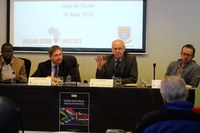South African Constitution as an export model
The event was officially opened by Prof Bernard Martin, Dean, Faculty of Law, UWC. The first speaker was Prof Xavier Philippe, Director, Louis Favoreu Institute, Aix-Marseilles University who discussed South African Constitution in constitution-making processes globally: An international perspective. He was followed by Prof Nico Steytler who talked about the South African model of multi-level government as a peace-making device in highly divided societies. Bongani Khumalo, Acting Chairperson, Financial and Fiscal Commission discussed the International borrowing from South Africa’s intergovernmental fiscal relations system. Prof Jaap de Visser, Director, Dullah Omar Institute spoke about when local goes global looking at the international impact of South Africa’s system of local government.
According to Steytler, the adoption of the 1996 Constitution and its successful implementation in the subsequent two decades, has been inspirational in the constitution making process of a number of fragile countries, providing a model of how to deal with conflict within a framework of constitutional democracy. Limited government through an enforceable Bill of Rights which included in particular socio-economic rights, an independent judiciary, democratic governance, and devolution of state power are some of the key features that found traction in new constitutions. Perhaps the best example is the 2010 Kenyan Constitution that borrowed heavily from South Africa’s. The colloquium seeks to reflect on the South African Constitution as an export model, the process of transfer, and the factors that have contributed to the attractiveness of this model.
This session was chaired by Postdoctoral research Fellow, MLGI, Dr Tinashe Chigwata.
The colloquium was followed by the book launch, which was a conversation between Prof Nico Steytler and the Deputy Dean of the Faculty of Law at UWC. The welcome address was delivered by Deputy Vice-Chancellor, Academic at UWc, Prof Vivienne Lawack.
The book compares the two countries’ systerms of devolution in terms of law and practice. Drawing on an indepth assessment of South African Practice of Multilevel government over the past 20years, lessons- both positive and negative – are identified that may assist in the development of the nascent Kenyan system.

